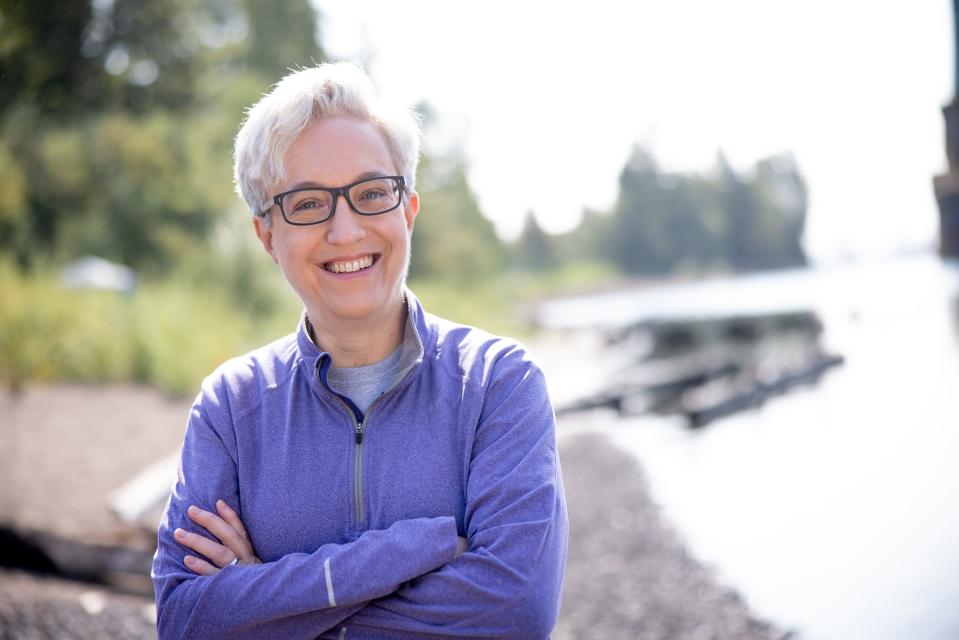First Oregon gubernatorial debate sets stage for three-way race
- Oops!Something went wrong.Please try again later.
- Oops!Something went wrong.Please try again later.
Oregon's top contenders for governor faced off Friday in the first debate of the campaign season.
The three women took the opportunity to define themselves and their opponents, and to outline their positions on the issues likely to dominate the 102 days until Election Day.
Former House Speaker Tina Kotek is the Democratic nominee. Former House Republican Leader Christine Drazan is the Republican nominee. Former Sen. Betsy Johnson is running as a nonaffiliated candidate.
Over the 90-minute debate, candidates received questions from a panel of newspaper editors during a meeting of the Oregon Newspaper Publishers Association.
The issues debated included: how the state should respond to climate change while balancing the energy needs of Oregonians; if the candidates would support gun control legislation; how the state should tackle the worsening homelessness and mental health crises; the candidates' positions on abortion access post-Roe v. Wade; and how each candidate would address the urban-rural political and cultural divide.
Drazan and Johnson largely pitched themselves as "change" candidates who would bring a different perspective to a Governor's Office that has been held by Democrats since 1987, Drazan by being a balance on Democratic control and ideas, and Johnson by rejecting both parties, which she said have become "too extreme."

Kotek positioned herself as the most experienced candidate who knows what needs to be fixed and has the track record proving her ability to get things done.
In a rare move for public debates, each candidate was also given an opportunity to ask one other candidate a question: Johnson to Kotek, Drazan to Johnson and Kotek to Drazan.
Johnson asked: "Without saying the phrase 10-year-plan or 5-year-plan, what would you do in the first year of getting elected governor to end tent cities and why hasn't it happened already? Why haven't you done it already?"
Kotek responded by saying her immediate actions would be to send more outreach teams onto the streets to build relationships with homeless people and get them into shelters with an eye toward eventual permanency. However, this plan would also require additional shelter space, navigation centers and mental health and addiction services statewide, she said.
"I've worked hard to get shelters funded and build new shelters and make sure people can move from tents to shelters to permanency and get the services they need, and we need more of that," Kotek said. "That's a day one priority for me, and I have the relationships and frankly the decisive leadership to make that happen."
Drazan asked Johnson: "You voted for the corporate activity tax. Since that time you have been very public about the fact that you regret that vote, you wish you hadn't taken that vote. What I would like to know is: Did you not know at that moment to vote 'no?'" Why did you vote yes?"
Johnson responded by saying lawmakers have failed to apply sufficient oversight of spending in the state, including of the Student Success Act, which the corporate activity tax funded (both were passed in 2019). She said the legislation that led to the tax was rushed and not thoroughly debated in public. Additionally, there was pressure from educators to pass the Student Success Act and the promise of significant public pension reform if the CAT tax moved forward, she said.
"In the end, my belief that we needed to have more money in education was substantiated by my vote. I believe that the corporate activity tax needs to be reviewed and mitigated. Its compounding effect is too big a burden on business right now in Oregon and I have heard that everywhere I go," Johnson said. "As governor, I would work to modify the punitive effects of the corporate activity tax and certainly build in benchmarks and accountability to accompany the spending on the education side of that ledger."
Lastly, Kotek asked Drazan: "You've been asked many, many times about the 2020 election and each time you've pivoted when asked. You've never directly answered the question, as far as I know, you have never publicly said that Donald Trump lost the presidency in the national election. Not just in Oregon, but nationally. So, will you say today that the results of the national election in 2020 were legitimate and that Donald Trump lost?"
"As it relates to the 2020 election, there has never been an issue for that with me. Donald Trump did not win. Joe Biden did. He is our president," Drazan said.
Drazan responded by saying that she is focused on Oregon and is not running for a federal elected position, so she always tries to bring her answers back to Oregon. She said she "stands with" Oregonians who are against fraud in any category of government, including within elections (according to a report by the Legislative Fiscal Office, the rate of voter fraud in Oregon from 2000-2019 was .00006%).

Recent polling suggests a tight race, though national forecasters still favor Kotek. FiveThirtyEight gives Kotek a 70% chance, Drazan a 30% chance and Johnson less than 1%. The Cook Political Report lists Oregon's gubernatorial race as "leans Democrat," recently downgrading it from "likely Democrat."
Reporter Connor Radnovich covers the Oregon Legislature and state government. Contact him at cradnovich@statesmanjournal.com or 503-508-6131, or follow him on Twitter at @CDRadnovich.
This article originally appeared on Salem Statesman Journal: First Oregon gubernatorial debate sets stage for three-way race

